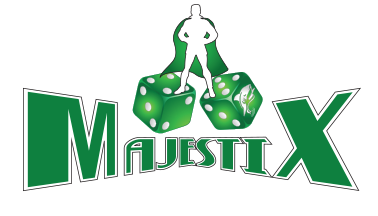
1. If a Game Element (characters, special objects, etc.) has an accompanying card, you MUST have that card present and available during your match (if playing an ATA, one copy must be printed out); failure to comply will result in a possible Game Loss or forfeiture of the use of that Game Element during a match.
2. A die or dice roll is considered “cocked” if the die or dice fall off of the table, land on or against another Game Element (standard objects are fine); even if it is flat, or if the die or dice fall between “cracks” of a table; all dice must be re-rolled.
3. You may only use 1 pair of dice in your game and no “gimmick” dice will be allowed (no bone dice, no die within a die, etc); you may only use the same pair of dice for any given game for rolls (no special “Super Senses” or “BCF” dice); inquire with a Judge if you are unsure about your dice.
4. pairs of Dice will be handed out and used by players in the Top 8 (if applicable).
5. As long as dials have not been clicked (due to damage or healing), or dice has been rolled for any game effect (ie, attacks or evading), or the game state has not changed and new information has been revealed, you may take your action back; otherwise it is at the discretion of your opponent.
6. Both players are responsible for knowing the Game State AT ALL TIMES, and remembering any Beginning of the Turn or End of the Turn triggers as well as all Game Effects; as long as the Game State can be repaired, there will be no severe Penalties for missed triggers and effects, although Warnings will be given out at the Judge’s discretion
-6a. Missed triggers that are mandatory can only be taken back if the game has not progressed too far and new information has been revealed, otherwise they will be dealt on a case-by-case basis.
7. Turtling is a strategy, but Stalling is cheating and will not be tolerated; if you feel that your opponent is Stalling, call a Judge over and he will overlook your game for Slow Play.
-7a. Slow Play is defined as not making a decision within one minute after an action has resolved. In other words, the game has to progress once an action or trigger has resolved (ie, deciding the next action or resolving another trigger).
-7b. Once a Judge has been called to observe, you will have 30 seconds to declare your next action or decision. Penalties can range from loss of that action to ending the turn.
8. Penalties for any Rules Violation range from Warnings to Game Losses to Disqualification (on a case by case basis).
-8a. Rules Violations: Game Play Violation, Slow Play Violation, Conduct Violation.
-8a1. Game Play Violation is defined as purposely trying to do an illegal play (multiple occurrences; intent to cheat)
-8a2. Slow Play Violation (see 7a); multiple occurrences; intent to Stall
-8a3. Conduct Violation is defined as displaying poor sportsmanship which include berating your opponent, physical altercations, and excessive complaining to the point where it makes your opponent feel uncomfortable.
9. If you disagree with a Floor Judge ruling, you may appeal to the Head Judge, but the Head Judge’s ruling is final
10. Spectators
-10a. Spectators are defined as players who are not in an active game/match
–10b. Spectators may not talk to players during their match about strategies or tactics. However, if you witness a game play error/violation, call a Floor Judge immediately and explain the violation. Do not interrupt the game. The Floor Judge will determine if any action should be taken.
11. Although this is a high-level event, this should still be a fun event; don’t be a dink to your fellow clixer! Display professionalism.

